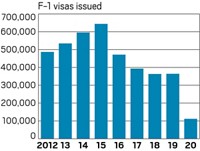Advertisement
Grab your lab coat. Let's get started
Welcome!
Welcome!
Create an account below to get 6 C&EN articles per month, receive newsletters and more - all free.
It seems this is your first time logging in online. Please enter the following information to continue.
As an ACS member you automatically get access to this site. All we need is few more details to create your reading experience.
Not you? Sign in with a different account.
Not you? Sign in with a different account.
ERROR 1
ERROR 1
ERROR 2
ERROR 2
ERROR 2
ERROR 2
ERROR 2
Password and Confirm password must match.
If you have an ACS member number, please enter it here so we can link this account to your membership. (optional)
ERROR 2
ACS values your privacy. By submitting your information, you are gaining access to C&EN and subscribing to our weekly newsletter. We use the information you provide to make your reading experience better, and we will never sell your data to third party members.
Employment
US travel ban expanded to 6 more countries
While most people will still be able to travel, scientists worry about the perception that the US is unwelcoming
by Andrea Widener
February 5, 2020
| A version of this story appeared in
Volume 98, Issue 6
The Donald J. Trump administration has extended a controversial travel ban to people from six more countries.
A bigger ban
A 2017 travel ban implemented by the Trump administration has extended immigration restrictions to six more countries.
New countries: Eritrea, Kyrgyzstan, Myanmar, Nigeria, Sudan, and Tanzania
Originally banned countries: Iran, Libya, North Korea, Somalia, Syria, Venezuela, and Yemen
No longer facing restrictions: Chad
Potential immigrants from Eritrea, Kyrgyzstan, Myanmar, Nigeria, Sudan, and Tanzania will face further restrictions when trying to move to the United States.
For chemists, the restrictions on Nigeria are likely to have the largest impact. Nigeria is the country with the largest population in Africa, and it sends the most students to the US from that continent.
The restrictions are just on permanent immigration, such as green cards, so students, visitors attending meetings, or scientists seeking temporary employment should not be affected. But the ban will likely still affect researchers not looking to immigrate, observers say.
Joshua Ayoola Obaleye, chair of the Nigeria chapter of the American Chemical Society and a chemistry professor at the University of Ilorin, was upset and confused by the ban. Chemists from Africa have already had trouble coming to the US for meetings in recent years, he says, including to the upcoming ACS meeting in Philadelphia (ACS publishes C&EN). He hopes this doesn’t make things worse.
Nigerian chemists want to study in the US or collaborate with colleagues there to help them become better scientists, Obaleye says. “Let America know that we love them,” he adds.
A chemist in the US from Nigeria, who asked not to be named for fear of repercussions, says that he and his friends are confused about why their country would be singled out for restrictions. “Nigerians have not been coming here to commit crimes,” he says. “They come here to develop themselves academically so they can contribute to their country.”
The ban will likely have the most impact on family immigration, which is not a common path for scientists to immigrate through, says Brian Getson, an immigration attorney from the firm Getson & Schatz. Getson encourages scientists who want to work and live in the US to keep trying. “You shouldn’t be scared to find a way to do it,” he says. Scientists who are already in the US can still apply to become permanent residents or citizens.
ACS “will monitor the new restrictions to assess how they will impact scientists beyond nonimmigrant visas and consider steps it might take,” says Glenn S. Ruskin, vice president for external affairs and communications at ACS. ACS gets around a dozen requests for assistance from people who are having trouble getting visas for recent meetings, including one or two from Nigeria. But more potential attendees likely give up before they ask for help.
Even though the ban won’t formally stop students from coming, “it will negatively affect the number of students who want to come to the US,” says Yacob Astatke, Morgan State University’s assistant vice president for international affairs. “The first question they are going to ask is ‘Why is America picking on our country?’ ” he says. He expects students will choose to go to a country where they feel more welcome, maybe Canada or Australia.
Historically black colleges like Morgan State often attract African students, Astatke says. Currently 20% of Morgan State’s international students are Nigerian.
The ban will also disproportionally affect science, technology, engineering, and math fields, he says. Nationwide over 50% of African students major in STEM, and that’s true at Morgan State as well, he says.
“I hope that the administration reconsiders this decision,” he says.




Join the conversation
Contact the reporter
Submit a Letter to the Editor for publication
Engage with us on Twitter